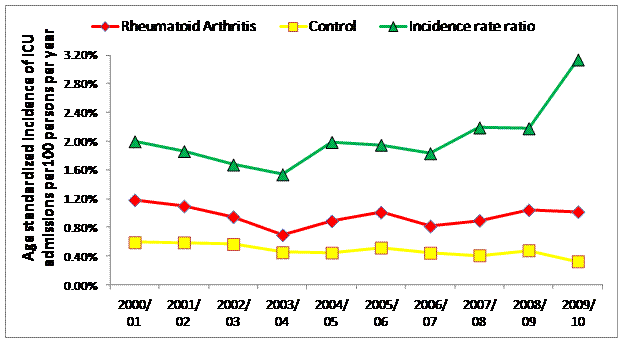Session Information
Session Type: Abstract Submissions (ACR)
Background/Purpose:
Comorbidity in Rheumatoid arthritis (RA) has been a focus of intensive research in recent years, but little is known about the incidence of critical illness in RA, as defined by admissions to Intensive Care Units (ICU). While hospital care is the largest component of health resource use in Canada, admissions to ICU consume a disproportionate share of costs. Using a large, population-based dataset we determined the incidence of ICU admissions in RA patients.
Methods:
In a stable population of over 900,000 adults, we used hospital claims from a large administrative database linked to a population based ICU database to determine the incidence of ICU admissions from 2000-2010. RA patients were compared to a cohort from the general population, matched on sex, year of birth and region of residence, with up to 5 controls for each case. Individuals with any diagnostic codes (ICD-9/10) for autoimmune inflammatory disease were excluded from the general population cohort. We estimated the annual incidence rates by age group, sex, and geographic region by stratification; (number of persons in each cohort who had at least one ICU admission/ number of persons alive in that cohort at year-end). The results were age and sex standardized to the general Canadian population. The incidence of ICU admission between the RA cohorts and matched cohorts were compared using incidence rate ratios (RR). We compared the 10 year cumulative incidence of ICU admission for the period 2000-2010: (number of persons with disease who had at least one episode of critical illness/ person-years at risk).
Results:
The age and sex standardized annual incidence of ICU admission was relatively stable over the 10 year period, at 0.82-1.18% for RA patients compared to 0.32-0.59% for the matched cohort, RR 1.53-3.14. The risk of ICU admission increased with age (age 18-39, 0.38% for RA vs. 0.10% for controls; age 40-59, 0.81% vs. 0.31%; age 60+ 1.74% vs. 1.09%) in a similar pattern to that seen in the general population. The 10 year cumulative incidence rate for RA patients was7.68% compared to 4.73% in the general population, with a RR of 1.62 (95% CI 1.46-1.80).
Conclusion: The risk of ICU admission is significantly increased in RA patients compared to the general population, with more than 1% of adults with RA developing critical illness each year, and a 10 year risk near 8%. This represents a substantial disease burden and cost to the healthcare system. Further work is ongoing to determine causes and predictors of ICU admission.
Disclosure:
C. Peschken,
None;
C. A. Hitchon,
None;
A. Garland,
None;
C. N. Bernstein,
None;
R. Fransoo,
None;
R. A. Marrie,
None.
« Back to 2012 ACR/ARHP Annual Meeting
ACR Meeting Abstracts - https://acrabstracts.org/abstract/high-risk-of-intensive-care-unit-admission-in-rheumatoid-arthritis-patients-a-population-based-study/

